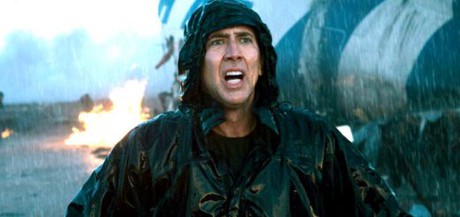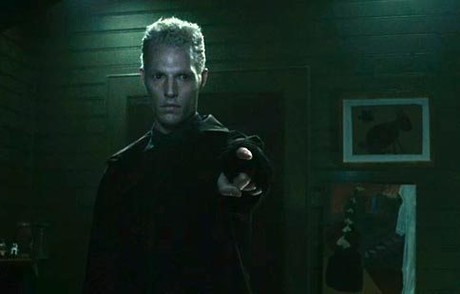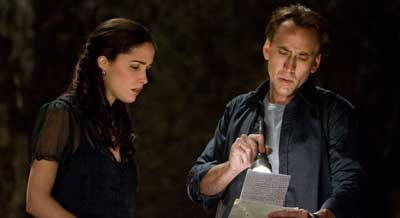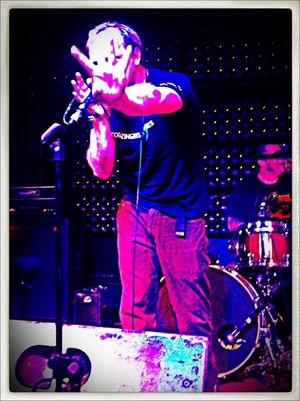VERBAL KINT IS KEYSER SOZE!
See, I told you there'd be spoilers.
This week's feature is KNOWING, the 2009 sci-fi thriller from director Alex Proyas (THE CROW, DARK CITY), co-starring Rose Byrne (X-MEN: FIRST CLASS, INSIDIOUS). KNOWING was on my list but it was originally much further down, slated to be viewed in late May. After sharing the list with a few close colleagues they suggested some titles I had omitted, and KNOWING got bumped to make space for LEFT BEHIND; because, obviously. LEFT BEHIND. Need I say more? The original film for this week was TIME TO KILL, an Italian film shot in Zimbabwe starring Cage released in 1989. Unfortunately, when I sat down with my list to determine how to screen each feature, I noted that I couldn't find the film to stream or even purchase. It is thoroughly obscure. I did read up on it and the reviews are split between "decent little foreign film" and "shoot yourself in your own face before you watch this horrid shitstorm" but alas I may never know. So TIME TO KILL was removed and KNOWING got a second shot at life. It has the distinct honor of being one of the films on this list that I hadn't seen prior to this year yet it did have a theatrical release. I'd deliberately avoided reading too much about it, but once again the public and critical feedback was evenly split between "damn fine film" and "if given the choice to watch this film or set yourself on fire I'd suggest you fill your pockets with kindling." Let's check out the trailer:
Honestly, that trailer is shit. I will say that I enjoyed this film and I'd glad I didn't know too much about it before watching it. That being said, now that I have watched it, I want to talk about it. So if you haven't watched it and you don't want every detail spilled out along with two wild theories that I have, stop reading and go view the film. If you have seen it and you want to take this dive with me, or you don't care about seeing it and just want to listen in, let's go further.
SPOILERS AHEAD!!!
THE PLANET OF THE APES was Earth all along!
Seriously, though, plot synopsis:
The film opens in 1959, with the class of William Dawes elementary preparing the school for its grand opening/groundbreaking ceremony, during which they will bury a time capsule. Each student is asked to draw a picture of what they imagine the future will look like, which they all do, with the exception of sunken-eyed weird kid Lucinda Embry. Lucinda is haunted by pervasive whispering, and she jots down a seemingly random series of numbers on her sheet of paper, which is pulled from her before she can add the final digits. During the time capsule's burial she slips away. After a massive manhunt she is found in a supply closet of the school scratching feverishly at the door.
Fifty years pass and we meet John Koestler (Nicolas Cage), a professor of astrophysics at MIT as he's sipping wine and grilling hot dogs for his partially deaf son, Caleb, who has a pet rabbit. They talk candidly with one another about the possibility of life on other planets, Caleb showing a mature confidence in this early scene that will never be seen again for the film's two-hour runtime. They make brief mention of Caleb's dead mom, then John retreats to drink whiskey. The next day Koestler is lecturing his class (which includes a young Liam Hemsworth) on the dueling philosophies of determinism and randomness. He trails off at the end, haunted by the death of his wife, and assures his class when asked what philosophy he prescribes to: "Sometimes shit just happens." Ben Mendelsohn (CAPTAIN MARVEL, ROGUE ONE: A STAR WARS STORY) arrives and lets us know it's Monday. He tries to coax Koestler out of his self-induced loner exile with a dinner invitation at the behest of a friend referred to as Doctor P. H. Double-Ds (whom we never meet; sorry, fellas), but just then John remembers he has to go to his son's school as their unearthing a fifty-year-old time capsule that day. Oh, which one could it be?
Koestler arrives in time to watch Caleb struggle through a poorly-rehearsed song with his class. The time capsule is unearthed and all the students are given a fifty-year-old envelope with a portrait drawn by either a dead person or a QVC shopper. Even Caleb gets one. Guess which one? Go on, guess.
...
Yep! He gets Lucinda's page of numbers! What are the odds? He immediately starts to see strangers in the distance and hear ominous whispering. They head home and John discovers that Caleb has brought his "drawing" home. He tells them they need to return it to the school the next day. He tells Caleb to go to bed, and when he goes to check on him later he finds Caleb watching home video footage of his departed mother. John goes back downstairs and starts drinking hard liquor while watching the same nature documentaries that Caleb does, most likely so he can be on an even intellectual keel with the youngster when and if he feels like discussing the lessons within. Distractedly he overfills his glass, spilling whiskey to the floor. He takes the glass to the kitchen to dab it clean with a paper towel ever so gently, and in doing so sets it atop the fifty-year-old paper full of numbers. It makes a ring around a few numbers that look bafflingly familiar. He goes to a white board and wipes away a few elementary spelling words and jots the numbers down: 911012996. He interprets it to mean 9/11/2001, and he does a brief internet search to learn verify that the death toll from that incident was revealed to be 2,996. He begins to find other dates on the paper and searches them on the World Wide Web and they all match up to disasters that claimed numerous lives, the tally represented next to each on Lucinda's paper. There are three dates that have yet to occur, the first of which is the very next day.
Koestler barely gets Caleb and the few other kids he agreed to drive to school that day there on time, then goes to the University and shares his findings with Phil (Mendelsohn), who looks upon the paper as a projection with dates in red and body counts in blue, but notes that many figures remain on the page with no relevance whatsoever. He reckons it to causation; to John finding meaning in a meaningless world because he still can't bear the loss of wife in a hotel fire the year prior, a "disaster" that is present on the sheet. He goes to see the old teacher and ask her about Lucinda, and she welcomes him in her home as she pours herself an Iced Tea and vodka cocktail. She offers John one, as well, but surprisingly he turns it down. He learns very little; only that Lucinda passed away several years prior from an apparent overdose, and that the old teacher has dementia, as she offers him a drink only a few moments after her first offer. Later on at home he is on the phone trying to get the names of the janitors in yesterday's ceremony and he sees Caleb in the front yard at the side of a car, where the mysterious Whisper Men give him a smooth black rock and drive away. While iGoogling (seriously, watch it) Lucinda he is paid a surprise visit by his sister who reminds him that he needs to make amends with his pastor father, for reasons. John drinks and compulsively watches the news all night hoping to find evidence of widespread death until he passes out. Caleb calls his cell in the afternoon and reminds him he's supposed to pick him and a few other students up after school. Stuck in traffic, John notes on his TomTom (that's a GPS device popular in 2009, for all you youngsters) that the latitude and longitude of his current location correlate to numbers following the sequence of that day's tragedy on Lucinda's sheet. He gets out of his car to jot ahead to the source of the traffic jam hoping for a heaping pile of bodies but is disappointed. Just then, an airliner comes barreling out of the sky, cutting across the freeway and crashing just off the median. John, powered by a heroism unforetold, runs into the burning wreckage, yelling at burning passengers, putting a few out with wet blankets, and pulling people from blasted windows. Parts of the plane are still exploding, but he soldiers on, trying to save as many people as he can. He eventually makes it home, and starts drinking. Phil comes to visit and John tells him he's convinced these figures have found him so that he can do something about these tragedies. Because, yeah, obviously.

John is awoken by screaming and runs to comfort Caleb after he is shown a vision of the world on fire from one of the mysterious "Whisper People" who all look a lot like Spike from "Buffy The Vampire Slayer." John chases one into the woods, letting him know he means business by smacking a tree with a baseball bat. He then goes out and buys a revolver, even going so far as to read the instruction manual that comes along with it. Looking for answers, John decides to stalk Lucinda's adult daughter and her young daughter, following them into a museum and arranging a meet-cute in front of some extinct animal exhibits. There he meets Diana (Byrne) and her daughter Abby. Byrne is second-billed in the cast and we are just now meeting her, fifty minutes into the movie. John shows his hand too soon, literally flashing her his school ID like it's a government agent credential, and Diana is rightfully freaked out and leaves. Determined to combat disasters and spurred by media hysteria that terrorism is a totally plausible thing that will happen if you're not vigilant, John searches the next set of numbers for their location and sees that they're in New York. He calls a tip in to the FBI from a payphone, sounding like a crazy person. He arrives the next morning at his sister Grace's place and drops of Caleb, then saunters off to New York to be a hero. He berates an officer there for not having the area he'd mentioned closed, so of course they try to apprehend him. He runs to the subway where he sees suspicious-looking people everywhere, because it's New York. He chases a suspect while the cops chase him and corners the guy, who drops the stolen Blu-Rays he had in his coat. Just then, a passing subway car jumps its rails, crashing into the station and other car, mowing down people in a visceral, vicious scene of destruction and death. AAAAAaand there's a Wilhelm Scream in the sequence. I'm not kidding, It's totally tonally serious, brutal as fuck, and horrifying, but you can distinctly hear a Wilhelm scream during the sequence, sticking out like a sore thumb inside the sound design of pummeled flesh and tearing steel and Marco Beltrami's stellar, scintillating score. John saved maybe one person and walks away unharmed and unquestioned. He picks up Caleb and heads to his home to find Diana and Abby on his doorstep. She'd seen the news and now believes him. She says that one of the dates he mentioned was the day of her own death, as foretold by her mother. They go immediately to Lucinda's home, completely intact and untouched by nature or squatters. While exploring the house they find a print of Ezekiel's "Chariot Vision" from the bible, as well as many of the smooth black stones beneath the bed. When he throws the bed up they see that she had scratched "Everyone Else" on the bottom of the frame over and over again, insinuating that the final disaster on the paper would claim the lives of Everyone Else on Earth. The children are once again visited by the Whisper People and alert the parents by honking the horn. John chases one into the woods but he blinds Koestler by opening his mouth and emitting a bright light. They go back to the Koestler residence and reckon with the thought that the world will be ending soon, then try to sleep.
The next morning John notices that Abby has colored in the Chariot in Ezekiel's vision and it is the sun. John rushes to the university obersvatory to check on a hunch, and sure enough, it looks like a massive solar flare will wipe the planet of all life within the next day or two. John calls his father and tells him to get underground, to prepare, but his father refuses; if it's God's time for him, so be it. Solar radiation ends their call abruptly. John goes to fetch Caleb and finds him writing the same sequence of numbers. He takes away the paper but Caleb keeps writing, then the pen and Caleb takes to scratching numbers into the desk with his bare fingers. This reminds John of Lucinda and the door she scratched stuff in, so he goes to the school without telling anyone why and tears the door off the hinges, then takes it back to his shed to try to scrape away the fifty years of paint touch-ups. He feverishly tells Diana that the coordinates are there to tell them where it's safe, but in her fear she takes the kids and runs off without him, determined to get to some underground caves she knows about. She stops at a gas station where she sees the emergency broadcast telling the nation that the world is ending, so Caleb hops out and calls his dad's cellphone which suddenly works. He talks to John, then Diana gets on the line and John reveals that the coordinates lead to her mother's mobile home and that's the best hope they have. In their ensuing argument the Whisper People show up and drive off with Diana's car, the children still inside. Diana hops into a nearby car and gives chase but is struck by a trailer while barreling through a red light. John goes to the gas station and aggressively questions the attendant, then drives off in the direction Diana was headed. Everywhere he goes is bedlam; people are panicking, rioting. He finds Diana in an ambulance and watching paramedics try and fail to save her. She dies at midnight on October 19th. The personnel flee the vehicle almost immediately and John is left alone to chat with Diana's corpse, holding her hand and finding it clutching a black rock. He speeds off to the mobile home, revolver in hand.
Once there he sees some tire tracks leading off into the woods and follows them, and soon he's on a road of sorts comprised of the black rocks. He finds Diana's abandoned car and walks into the dark to find one of the Spikes standing stock still. He threatens him until Caleb comes running out to him with a bunny rabbit. Abby is also close by, safe, with a bunny of her own. Soon a giant orb appears in the sky and descends, and the children explain that the Whisper Men have chosen them so that everything can start over, but the Whisper Men step forward and forbid John to board. Only the chosen ones, who can hear their whispers, are allowed to board. John tells Caleb he should go without him, giving him a locket that his wife had intended for John on his birthday but died before she could. It contains a picture of the family with an inscription that reads "Together Forever," a refrain the couple have repeated to each other throughout the film. The Whisper Men reveal themselves to be beings of pure light with great asses. Caleb and Abby board the vessel and it takes off from the Earth, as we see that many have around the globe. John drives to Boston to see his father, mother, and sister, and they embrace as a wave of fire decimates the land, and them. Caleb and Abby are shown on a new world, similar to ours, where they let their bunnies frolic as they run toward a "Tree of Life."

If it seems like that's an awful lot it's because it is. This movie is surprisingly busy, which makes it all the more miraculous that it works. The opening titles that play after the prologue show night spreading Westward across the United States and the cities coming to life with light, which is bookended by the wave of fire that destroys all of Mankind's triumphs in the end of the film. Which, by the way, they didn't have to show us, but they wanted to. And it's an amazing sequence. The plane wreck, the subway crash; they're all amazing sequences, brought to life by Beltrami's score.
The film does fine work of answering callbacks, like the frequent heatwaves and solar spikes causing GPS disruption which caused the plane to crash. The explanation that Caleb wears his hearing aid because "sounds get jumbled," obviously because he's been hearing the whispers of the pure beings of light with great asses. Even Lucinda's initial introduction finds her staring directly into the sun, regarding not with awe but with fear. The bunnies, talk of otherworldly life, the idea of an afterlife. Everything seems to pay off.
Which is why some of the inclusions seem extraneous. I love Ben Mendelsohn and I'm glad he's here but he doesn't do anything. Neither does the gun, or John's one-sided goodbye to Diana, or even Diana's impetuous escape. Furthermore, John himself is rather ineffectual in his efforts to avert tragedy, something he states he would absolutely have done if he'd found this message earlier, before his wife died. It informs one of my theories:
Despite it's clearly deterministic plot, the film is about randomness and the futility of "plans," The smallness of Man, his ideals of Free Will and a Benevolent God who guides it all with a "Knowing" hand. That knowing the future does nothing for us, as we are not in it yet, and we will arrive as it does to us simultaneously, so nothing we do leading up to it can affect it. The arrogance to think that an unremarkable man could have prevented the 9/11 attacks, or a volcanic eruption, or a tidal wave. That is perhaps most clearly elucidated in the subway scene, when John thinks he can stop a man with a bomb only to find a mechanical malfunction throw forces far too unwieldy for any man to combat. That no matter how badly we want a villain to vanquish, "sometimes shit just happens."
Another theory, and one that is surprisingly more likely, is that none of that happened. John Koestler is drunk for so much of the movie, and clearly dealing with grief. Phil remarks early in the film that John weasels out of social engagements with Caleb-centered emergencies far too frequently, and in fact he breaks that conversation off with the remembrance that he has to be at the school to watch Caleb sing. In the disaster sequences, Koestler is suddenly a heroic figure, though it seems his whole aesthetic is fashioned to make him look like the most average John one could imagine. He walks through situations largely unseen; he isn't tended to by emergency personnel at the plane crash, isn't detained at the subway bedlam, and is dismissed with a flat "We can't help you, sir." when he arrives at Diana's crash site. He is fully ignored when he arrives, speeding in a too-large pickup truck, almost running over a policeman, with no reaction and again, he is suspiciously alone with Diana after she's passed, departing without question. In the final frames of the film he drives through war-torn Boston and no one tries to board, steal, destroy, or even acknowledge his truck slowly peeling through the chaos. When he arrives at his parents' house and Grace asks "Where is Caleb?" he gives the creepiest smile he's cocked for the whole film and says "He's safe" and SHE DROPS IT! No one would do that. I wonder if even Grace is real, or if she is a projection of actual spiritual grace. Even when he arrives in New York he seems to park the truck in a space that doesn't seem like a parking spot and walk right into his mission. It's all a drunken fantasy, a man completely spun out of control dreaming himself into some Homeric scenario where the world has stopped to take notice of him and give him the opportunity to affect his world in a truly significant way.
Much like Proyas' DARK CITY, KNOWING is an allegory of control, though one with clearly heavy-handed spiritual overtones. The Beings of Pure Light with Great Asses have wing-like flares from their shoulders when they ascend and even deposit the children in simple white tunics when they reach their New World. It's a very obvious Genesis theme, and I think we all know what the bunnies are meant to symbolize. What KNOWING does well is present common themes in common language but then ask its viewer to look further. By referencing synchronicity, loudly trumpeting Koestler's alcoholism and delusions of grandeur, and even using the same actress for Lucinda and Abby, the film allows its viewer to question themselves, offering enough ambiguity to wonder if maybe we leapt to our own conclusions to craft a narrative more akin to our own level of comfort.
If I have one big gripe with the movie it would be the sequence of events which spur our protagonists into the story. I was disappointed that we met Cage's John and his son before Caleb received the list. I'd have preferred we leapt forward to 2009 and been at the ceremony, the capsule coming out, the papers being handed to grabby kids (Seriously, that sequence is one of the most frightening of the whole film; those kids are fucking scary scrambling for some bullshit that they won't care about in 15 seconds), and Caleb staring down at his selection with furrowed brow, the whispering growing louder in his ear. Then you could cut to Koestler in the classroom, trailing off during his lecture, Phil coming in to be an exposition machine, then John cutting the conversation short to go get Caleb and lay eyes on the MacGuffin. It seems cleaner to me, from a storytelling standpoint. But, hey, where am I coming from?

All in all, I enjoyed KNOWING, because it made me think. As a movie about events, largely, a lot of the character work is swept up in the spectacle, but that's where employing an actor like Cage really shows the foresight of the production. Odd as it is, a personality so big grounds this thing, especially if my theory that John Koestler is an egomaniac who needs to make the world burn for his own place in it to make sense rings true. What did you all think of KNOWING?
Until next time, you all stay safe and stay sane!!!
-McEric, aka Eric McClanahan-

